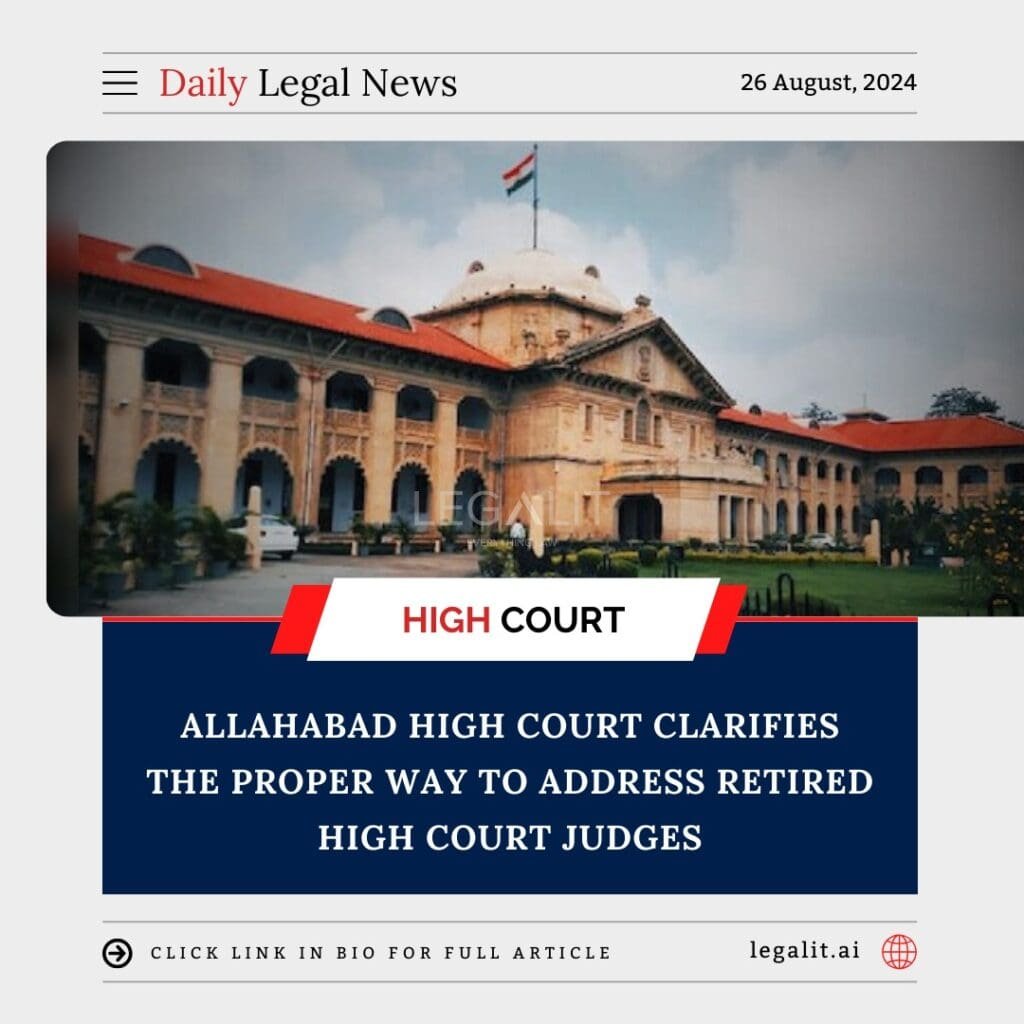
In a recent ruling, the Allahabad High Court provided crucial guidelines on how the names of retired High Court judges should be written and addressed. This clarification aims to preserve the dignity and respect associated with the judiciary, even after a judge has retired. The ruling emphasizes the importance of maintaining proper decorum and protocol in legal documents, official correspondence, and public mentions, ensuring that the honor of the judiciary is upheld consistently.
Background and Significance:
- Judiciary’s Role and Respect: The judiciary holds a revered position in society, with High Court judges often seen as embodiments of legal wisdom and fairness. The respect and honor associated with a judge do not cease upon their retirement; rather, it continues, reflecting their lifelong commitment to upholding the law. The Allahabad High Court’s recent directive seeks to formalize this respect in the way retired judges are addressed, reinforcing the notion that their service and contribution to the legal system should always be recognized.
- Common Practices and Misconceptions: There has been some ambiguity and inconsistency in how retired High Court judges are referred to in various legal and public contexts. Often, retired judges might be addressed simply by their name, without any formal titles, which can inadvertently diminish the respect traditionally accorded to them. The Allahabad High Court’s clarification addresses this issue, aiming to establish a uniform standard for addressing retired judges.
The Court’s Guidelines:
- Proper Title Usage: The Allahabad High Court has stipulated that when referring to a retired High Court judge, the correct format should be “Justice (Retd.) [Name].” This ensures that the title “Justice” is preserved, acknowledging their past role and the esteem that comes with it. The inclusion of “(Retd.)” clearly indicates their retired status, balancing respect with accuracy.
- Application in Legal and Public Documents: The court emphasized that this format should be used consistently in all legal documents, official letters, media reports, and any public references to retired High Court judges. This uniformity not only upholds the dignity of the judiciary but also avoids confusion or the inadvertent omission of proper titles.
- Respect Beyond Retirement: The directive reflects a broader principle that the respect for a judge’s position extends beyond their active service. By ensuring that retired judges are addressed with the same formal respect as serving judges, the court reinforces the enduring nature of the judicial honor.
Implications of the Ruling:
- Maintaining Judicial Dignity: This ruling by the Allahabad High Court plays a significant role in maintaining the dignity of the judiciary. It reminds the legal community and the public at large that the honor associated with the title of “Justice” does not expire with retirement. The consistent use of the correct titles fosters a culture of respect and ensures that the legacy of a judge’s service is properly acknowledged.
- Setting a Precedent: The court’s guidelines are likely to set a precedent for other High Courts and legal institutions across the country. By establishing a clear standard, the Allahabad High Court has paved the way for a uniform practice that could be adopted nationwide, contributing to the consistent recognition of retired judges’ contributions.
- Educational and Training Programs: Legal institutions, including law schools and bar associations, may incorporate this directive into their training and educational programs. This will ensure that upcoming legal professionals are aware of the proper protocols and help instill a sense of respect for the judiciary from the start of their careers.
Conclusion:
The Allahabad High Court’s clarification on how retired High Court judges’ names should be written serves as an important reminder of the enduring respect that the judiciary commands. By formalizing the proper way to address retired judges, the court not only upholds the dignity of the legal profession but also ensures that the honor associated with judicial service is preserved for posterity.
This ruling sets a critical precedent that will likely influence how retired judges are referred to across various platforms, fostering a culture of respect and consistency within the legal community. As the legal landscape continues to evolve, the guidelines provided by the Allahabad High Court will play a crucial role in maintaining the decorum and honor of the judiciary, ensuring that the contributions of retired judges are recognized and respected in perpetuity.